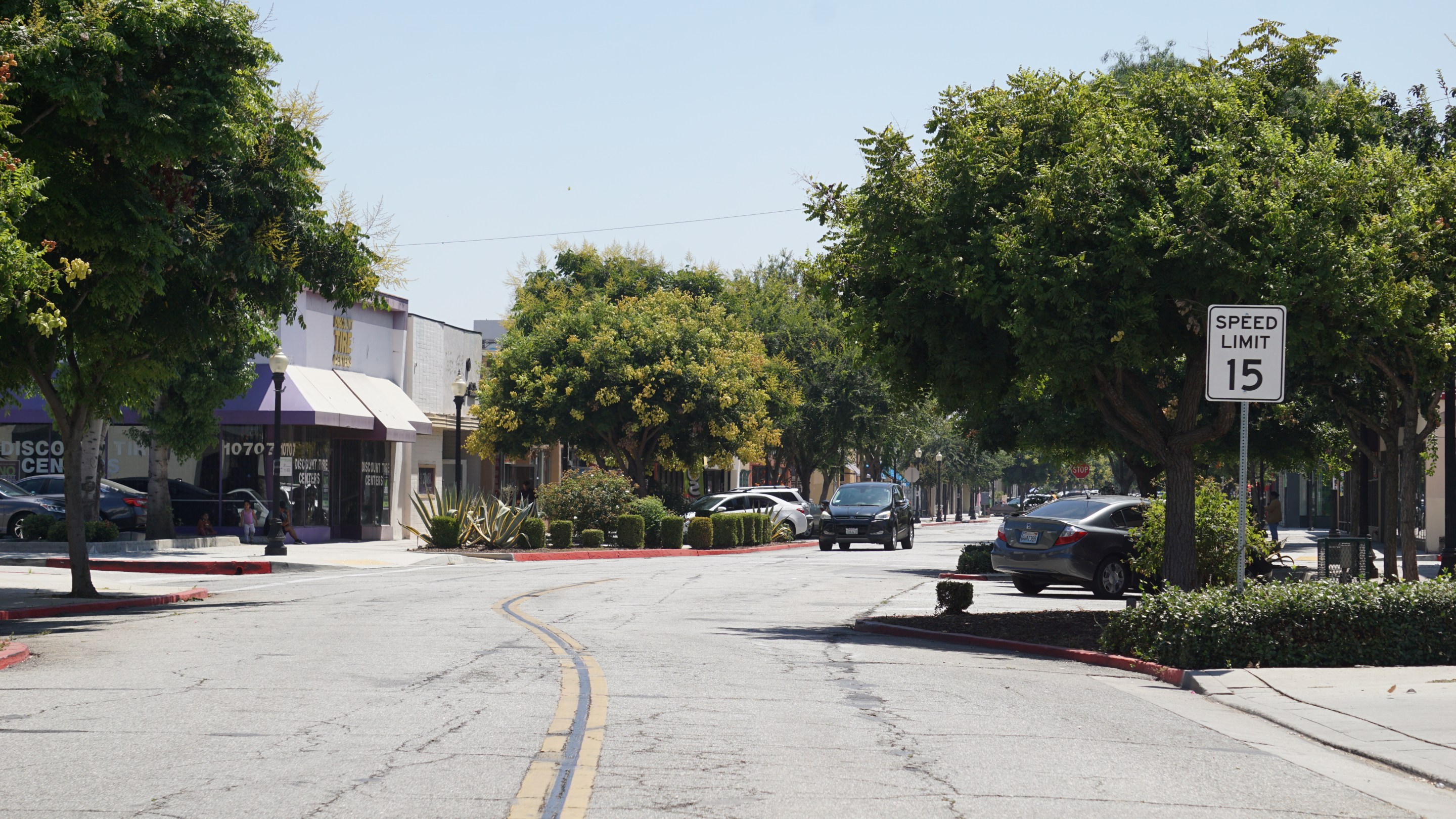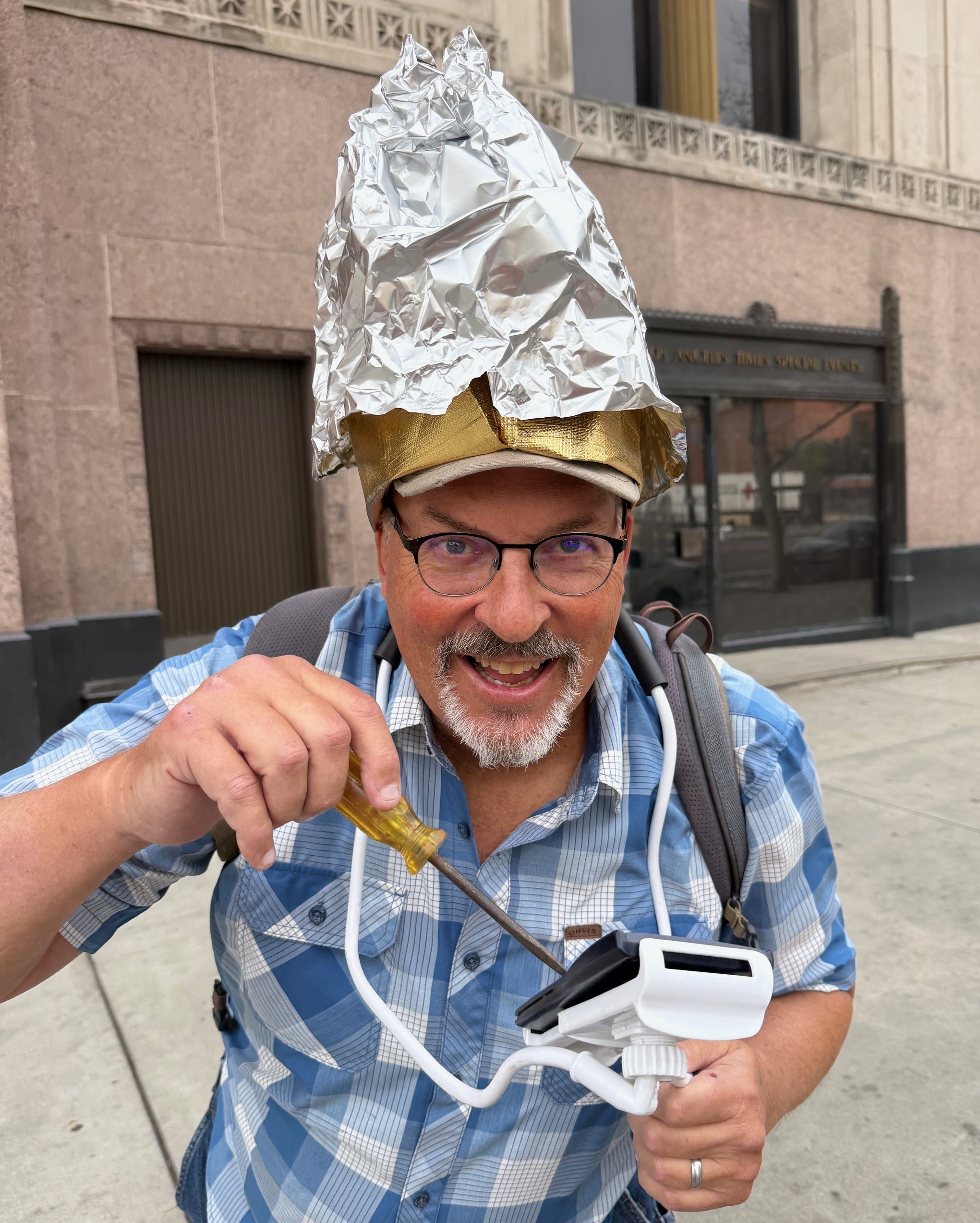The city of El Monte is in the initial stages of planning a large-scale complete streets project on Valley Boulevard and Main Street. The city's feasibility study is currently in the conceptual design phase, with proposed designs shared at recent meetings and pop-ups. Two options have been presented so far (see the current proposal details via the city's slide show, much of which is too wide to take legible screen captures), though these early designs are already changing in response to community feedback.
El Monte's complete streets project has a number of concerns to navigate. The streets, especially Main, support existing small businesses that cater primarily to the surrounding predominantly Latino working class population, many of whom are immigrants, and their families. Many of these residents get around on foot and via transit. A few ride bikes, mostly on sidewalks (risking being ticketed). Most drive.
The El Monte area's Asian/Asian American population has also grown substantially in the last few decades, and is largely working class too. Main Street has a few Asian-owned stores.
The city's push to improve transit, biking and walking is needed, but also begs the question of who these improvements are for. Is the city supporting the health and wellbeing of its current population? Or are bikeability and walkability designed to support redevelopment, and likely to lead to gentrification and displacement?
Main Street is struggling - to a large extent - and needs help, but too much of the wrong sorts of change could lead to displacing family-owned community-serving retail in favor of chain stores.
It will take a lot of listening, sensitivity and creativity for El Monte to thread the needle of improving safety for people on foot and on bike, expanding residents' healthy and convenient transportation options, helping Main Street thrive, all while minimizing any displacement of current residents and businesses. The city needs to strike a balance between space for drivers - including parking - and space for other modes. Bike and walk facilities need to be strategic enough to offer real safety benefits, while perhaps not so far-reaching as to trigger driver backlash.
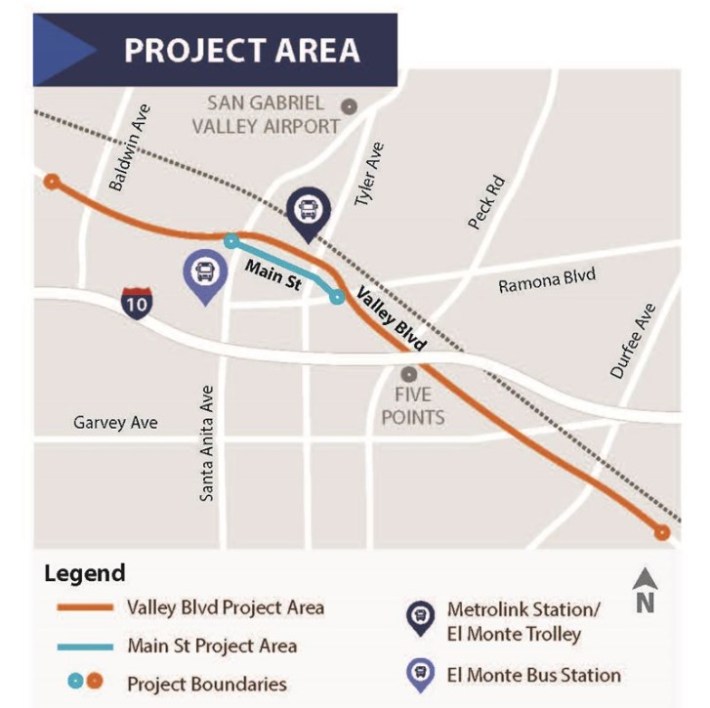
The project focuses on two very different interconnected streets that serve as the city's prominent commercial backbones.
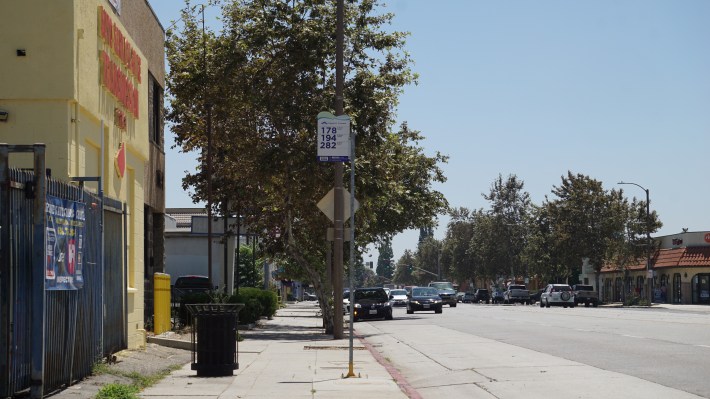
Valley Boulevard is El Monte's main artery connecting residents to freeways, transit centers, City Hall, and a river of strip malls. Valley is a major east-west arterial that spans the entire San Gabriel Valley. The 3.3 miles of Valley in El Monte (from the Eaton Wash/Rowland Avenue to the San Gabriel River) are included in the study. The mainly five-lane-wide street is served fairly well by buses (Foothill Transit, Metro, and El Monte Trolley), but is generally a car-oriented commercial corridor not unlike hundreds of other arterials throughout Southern California.
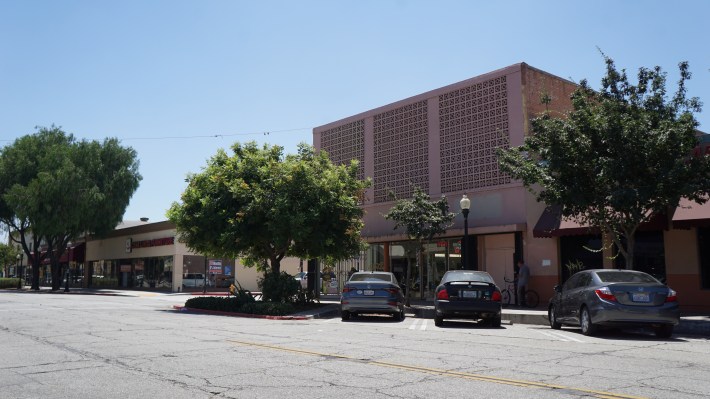
One block south of Valley, El Monte's Main Street is the heart of the city's historic downtown. Main's two-lane, half-mile long, zero-lot-line urban form originated over a hundred years ago at a time when Southern Pacific and Pacific Electric Red Car trains served the local populace.
Though the retail strip got its start decades before, Main's current street configuration was laid out in 1965 when the city created the "El Monte Valley Mall" by rerouting Valley Boulevard to the north, where it lies today. The short retail street, then renamed Valley Mall, was essentially a drive-through mall.
In its heyday, the Valley Mall was a major shopping destination drawing customers from across the SGV. By the mid-80s, large anchor stores had departed for bigger, more suburban mall sites, and merchants and the city began formulating revitalization plans, which continued through the last decade (when the street "Valley Mall" reverted to "Main Street") and include today's complete streets plan.
Today businesses in the Valley Mall are largely non-chain, local, family-owned, serving the surrounding Latino population. The Valley Mall has popular establishments, but also struggles with quite a few vacancies, as a lot of the city's commerce has shifted to more car-oriented streets like Valley and Garvey Avenue.
Main Street currently has on-street diagonal parking in front of stores, and many larger parking lots behind them.
Both Valley and Main are located near the El Monte Bus Station, the El Monte Metrolink Station, and the Rio Hondo river bike/walk path. Though plenty of people walk there, the current street designs cater to drivers.
Dawn Wilson, Office Executive for design firm Michael Baker International, explained the project’s guiding principles at a public workshop in late June. “We've taken a very close look at all of the crossings and at the intersections and we're looking for ways to make sure that pedestrians and bicyclists are highly visible to those who are driving along the corridor and also improve intersection safety for those who are driving.” said Wilson.
“And then Main Street’s really the commercial heart, the little downtown area in the city.” said Wilson. “And when there's a farmers market, it's just great, it's hoppin’. There's a lot of people out there walking and experiencing the corridor. And with this project, we're really looking for a way to continue to build upon the momentum that we see every Thursday during the farmers market.”
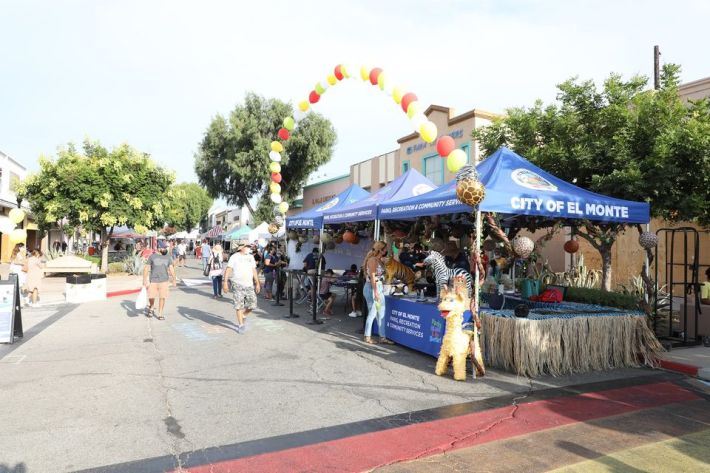
Valley Boulevard Concepts
Throughout the Valley Boulevard corridor, American Disability Act improvements are planned, like at the intersection of Garvey, where some curb ramps are missing.
Valley would also receive additional and upgraded higher visibility crosswalks and, in some locations, bulb-outs to shorten crossings.
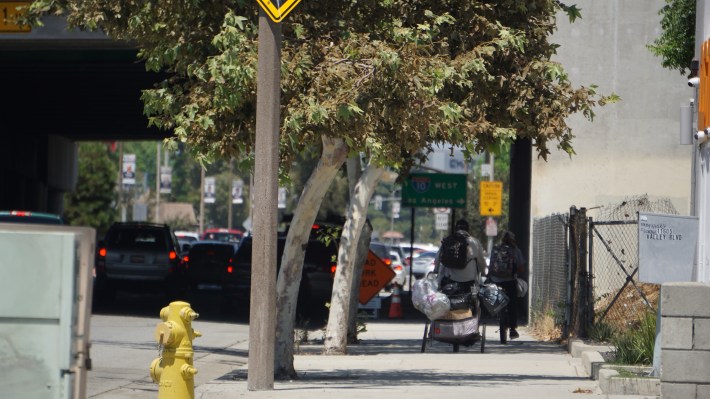
Both Valley concepts feature three miles of new bike lanes spanning the city.
The options for bike lanes would be either basic painted (Class II) bike lanes with a two-foot buffer from cars, or protected (Class IV) bike lanes with physical separation. To free up space for Valley bike lanes, the city would "right-size" the street, in some stretches eliminating on-street parking, eliminating a travel lane (called a road diet), and/or narrowing vehicle lanes. All these treatments would reduce travel speeds.
The narrower segment of Valley that was created by rerouting in 1965 (between Santa Anita Avenue and Ramona Boulevard) does not have sufficient space to easily accommodate a buffer between cyclists and cars, even with a lane reduction.
Steven Wright, a consultant from Next Level Engineering and Project Manager for El Monte Complete Streets, noted so far "That [lane reduction] was not met with a lot of positive feedback" from the public, though he told SBLA that the bulk of the proposed bike lanes were received well, including by mobility non-profit ActiveSGV.
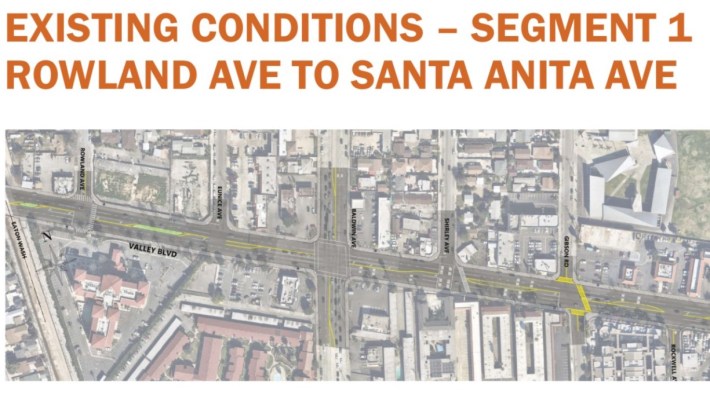
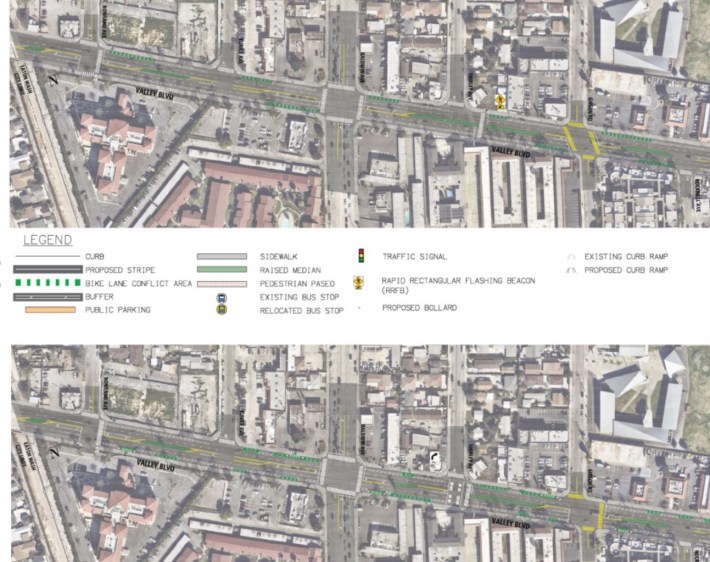
The design concepts would move some bus stops further away from signalized intersections to avoid sudden car weaving. Protected bikeway options incorporate raised bus boarding islands between bike lanes and car lanes, similar to nearby Ramona Boulevard.
Main Street Concepts
On Main Street in the Valley Mall, the two city proposals are markedly different from each other.
Concept one would be a pedestrian paseo, closing the middle of Main off to vehicle traffic. The design shows a large pedestrian paseo area for three blocks of Main between Lexington Avenue and Center Avenue, plus five shorter stretches of connecting streets north and south of Main. Drivers would still be able to enter Main Street from the east or west, and then be directed to the mall’s larger parking lots in lieu of on-street storefront parking.

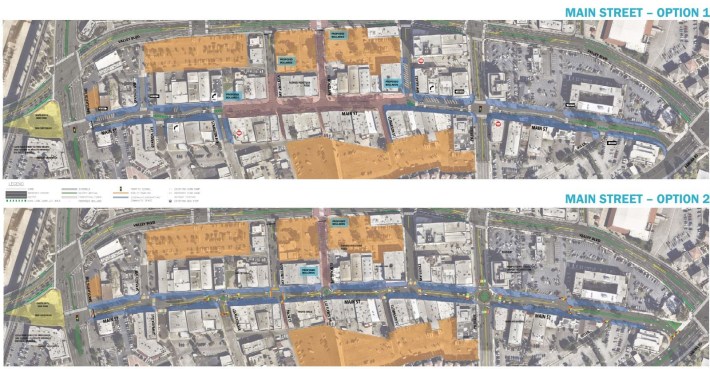
The second option would leave Main open to vehicle traffic, but would do away with storefront parking for the sake of wider sidewalks with increased landscaping, more street furniture and outdoor dining options.
Responses to these concepts have been mixed, according to Wright, who noted that "Main Street is really up in the air." He said some visitors to a pop-up presentation liked the closure idea, but business owners are another story.
At the public workshop, Blanca Medina of the Downtown El Monte Business Association (DEMBA) expressed concern about getting rid of storefront parking or closing the street to cars, saying her party supply business and others in the mall rely on passer-by customers.
Wright told SBLA that regular closures of Main Street - in addition to Thursday night farmers' markets - are still up for discussion, though there's no consensus on how long or how often. "We're not married to any concept," said Wright, also noting that retaining storefront parking could very likely be part of the next round of concepts.
Wright expects that by late August, the project team will set up a public meeting targeted to the mall's businesspeople. "We'll invite all the businesses along Main Street and take this presentation to them and get their feedback," Wright stated. "Because when we go to the pop-up events, which are farmers market-related, we're hearing from a different group. And it's not fair, just to look at that perspective, because they're visiting on that Thursday evening. We need to know what the feeling is for the people who are there 24/7."
Valley and Main at Santa Anita Avenue
Lastly, there are potential big changes at the west end of Main Street where a new mini-park is proposed.
Currently eastbound drivers on Valley can fork to the right to drive straight into the Valley Mall via a one-block one-way stretch of Main Street. The city is proposing a new pocket park there, on the empty lot bounded by Valley, Main, and Santa Anita - adjacent to the Rio Hondo path.
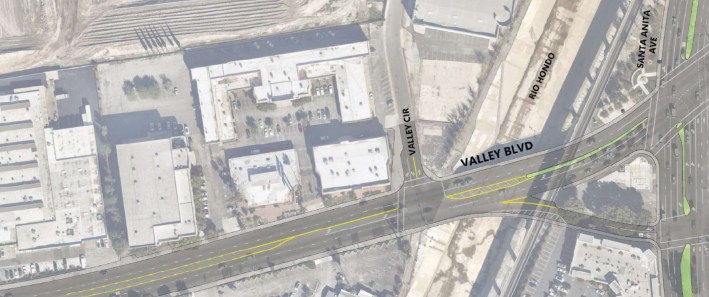
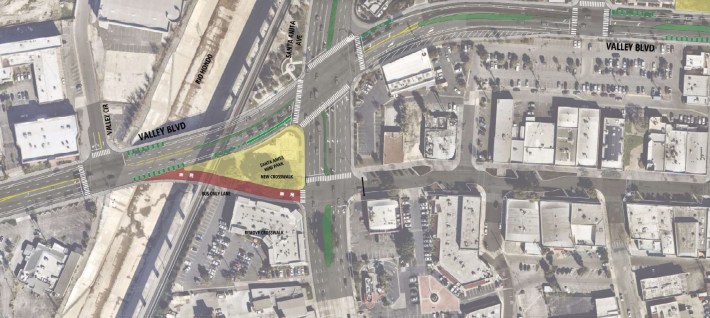
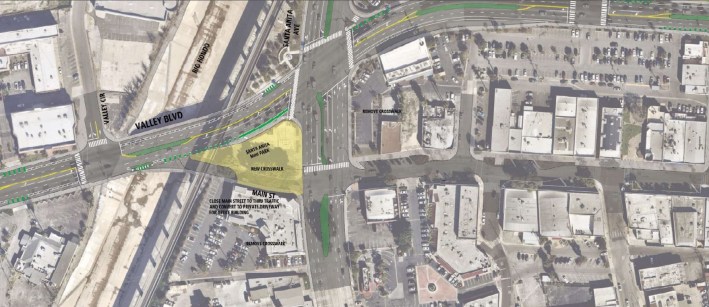
Initial concepts would close that one block of Main, discouraging eastbound drivers from driving into the proposed pedestrianized stretch of Main Street.
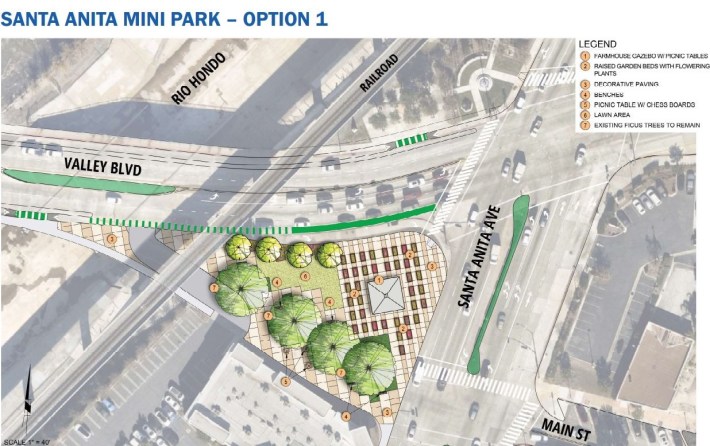
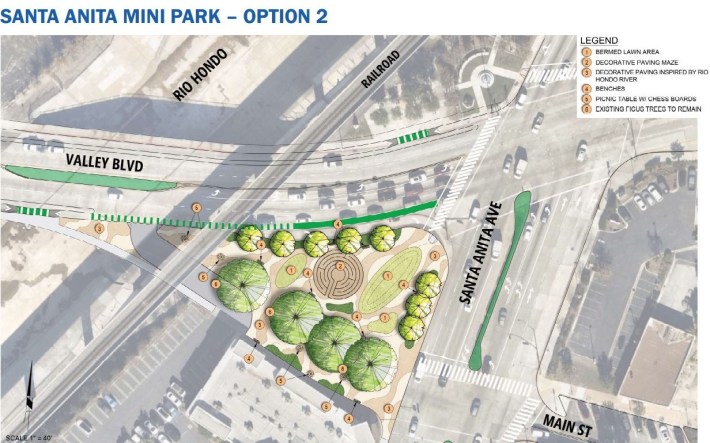
Wright told SBLA that response to cutting off the fork has generally been good.
What next?
Wright expects that revised concepts - at least for Valley and the pocket park - should be ready hopefully by late September.
"And that depends on what happens with our Main Street Meeting," stated Wright. "Later this month, as long as we're able to engage in and gather some consensus and some thoughts and ideas, then we'll have them all ready for a second round of community outreach in October."
For additional information and to take an online survey, visit El Monte's Valley Boulevard and Main Street Complete Street Feasibility Study project webpage.
Streetsblog’s San Gabriel Valley coverage is supported by Foothill Transit, offering car-free travel throughout the San Gabriel Valley with connections to the Gold Line Stations across the Foothills and Commuter Express lines traveling into the heart of downtown L.A. To plan your trip, visit Foothill Transit. “Foothill Transit. Going Good Places.”Sign-up for our SGV Connect Newsletter, coming to your inbox on Fridays!
